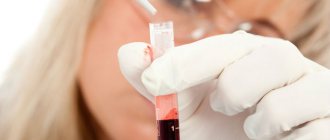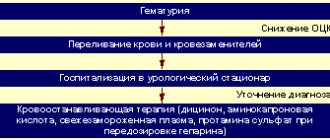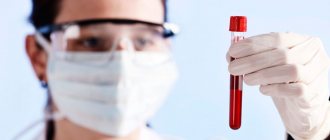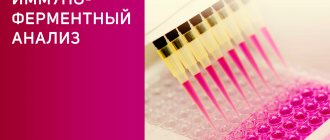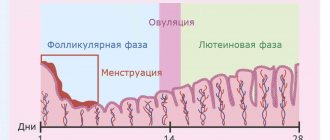CA 125
CA 125 is a high molecular weight glycoprotein that is secreted by the endometrium and some cystic formations. Normally, it is detected in small quantities in the blood. An increase in its level occurs when the integrity of the endometrium is violated (menstruation, endometritis, endometriosis, etc.), as well as with ovarian cysts. In oncology, CA 125 is most often used in the diagnosis and monitoring of ovarian cancer. But due to its rather low specificity, it is prescribed together with other tumor markers, for example, HE4. This combination makes it possible to more accurately differentiate benign ovarian tumors from malignant ones. In some cases, this allows you to reduce the number of invasive procedures used, and in others, on the contrary, it allows you to make a timely decision to send the patient to an oncology hospital.
| More information about diagnostics at Euroonko: | |
| Tumor markers for women | from 1600 rub |
| Oncologist consultation | from 5100 rub. |
| Screening for cancer | from 13400 rub |
High CEA tumor marker
In fact, there are many reasons for the increase in the production of this protein compound. Moreover, they are the same for men and women. We have highlighted the main ones, which are the most popular and occur more often than others:
- Smoking. It is known that the CEA tumor marker in a smoker always reveals a significant increase in pathological protein in the blood.
- Inflammatory process in any human organ and system.
- Pulmonary tuberculosis.
- Cirrhosis of the liver.
- Nodular enlargement of the liver.
- Hemangioma.
- Cystic fibrosis.
- Crohn's syndrome and many others.
- Development of benign formations (polyps, fibromas, lipomas, neuromas and others).
- Oncology and metastases.
If the cause of the increase is not cancer, the CEA tumor marker will show an increase in the range of 5-10 ng/ml without subsequent changes in level in the absence of treatment. If this figure is higher, depending on the organ/system being examined, additional examination may be required to identify the location and stage of tumor development.
Analysis to monitor the effectiveness of therapy
Studying the concentration of tumor markers allows us to evaluate the effectiveness of cancer therapy. For example, after surgery and chemotherapy in patients with high concentrations of indicator substances, a significant decrease is observed. This indicates positive dynamics.
If tumor markers continue to increase during therapy, this indicates a possible relapse of the tumor or its resistance to treatment. In such a case, the doctor prescribes additional examinations and changes the tactics of treating the disease.
AFP
AFP is a glycoprotein. Normally, it is secreted by the cells of the liver and gastrointestinal tract of the fetus, so it is used for screening studies during pregnancy to identify pathologies of intrauterine development. But in oncology, this marker is determined for hepatocellular carcinoma (liver cancer) and malignant neoplasms of the gonads. A moderate increase in AFP levels can be observed in liver pathologies - chronic hepatitis, cirrhosis, as well as in severe intoxication. The material for research is blood.
When is it necessary to see a doctor?
An increase in the indicator to a level of 10 μg/l or higher is a reason to immediately undergo examination
. Decoding the CEA tumor marker is a really important procedure; with its help, it is possible to obtain many times more information than from a banal oncology test.
Typically, with such high concentrations of CEA, women begin to experience other symptoms. The most common occurrences are:
- causeless cough, frequent shortness of breath;
- general fatigue and lethargy, even with moderate exercise;
- a swelling protruding on the body that is easily palpable;
- body temperature rises, active sweating is observed;
- appetite decreases or is completely absent;
- weight loss unreasonably;
- disruptions in the functioning of the gastrointestinal tract occur;
- moles appear;
- wounds heal poorly, causeless bleeding may occur;
- aching pain in certain parts of the body.
If you notice such symptoms, it is important not to panic and consult a doctor as soon as possible, while realizing that cancer in the early stages is curable.
When to donate blood for markers and how to prepare
Let us immediately note that what a blood test for tumor markers shows is not a diagnosis. This is only the first step, which can carry up to 95% of what is happening in the body. Therefore, checking the oncoprotein norm is always accompanied by other examination methods, in particular, magnetic resonance and computed tomography, ultrasound, and radiography.
The main indications for analysis are:
| Diagnosis of early detection of cancerous compaction. |
| Checking for the presence of metastases in the absence of any symptoms. |
| Drawing up the most suitable and effective treatment program for cancer, selecting medications and their dosages. |
| Monitoring and evaluating the effectiveness of the chosen treatment program and the effectiveness of the drugs used. |
Testing the normal level of tumor markers is prescribed for risk groups and people over 50 years of age, since the production of these substances increases with age.
Please note that a blood test for tumor markers in women and men is taken only for each type separately, as prescribed by the doctor. Depending on the suspected location of the tumor, testing only one marker may be sufficient to identify it. But more often than not, the complete picture is provided by the group that best fits together.
Preparation in most cases does not require special actions, and it is almost similar to the requirements for a blood biochemistry test:
| Refusal to eat 4-12 hours before the procedure. You should also exclude coffee, tea and juices. Only non-carbonated water is acceptable, including on the day of blood collection. |
| Stop using medications in consultation with your doctor. If this is not possible, you should definitely notify the laboratory assistant about this. |
| Avoid alcohol and smoking 12 hours before the start (this also applies to hookah, smoking various aromatic tobaccos and electronic cigarettes). |
| Try not to visit a massage therapist or undergo diagnostic manipulations several hours before testing. |
| Reduce physical activity. Enough leisurely walks. |
It is also necessary, if possible, to prevent stressful situations and not to be nervous. Remember that compliance with these requirements will allow you to obtain high-quality and reliable results.
Women need to plan the analysis based on the period of the menstrual cycle. An appropriate specialist will help you choose the right day when your hormonal levels are optimal.
Technique for testing blood for oncoproteins
The point of testing is that you need to be tested for tumor markers in a specialized laboratory.
The best time for this procedure is between 8 and 12 am. Before starting, the patient is seated on the couch (in some cases it is necessary to take a supine position), then blood is taken from a vein in the traditional way using a syringe and the material is transferred to a test tube with a cap.
The resulting blood is processed in special equipment, where the serum is separated from the plasma. The resulting serum is the sample into which antibodies are injected and the interaction is observed. The resulting reaction is the result of a blood test for tumor markers, and what it shows is entered into the patient’s card.
Cancer prevention
To minimize the risk of cancer cells forming in the body, you should take care of your health, boost your immunity and suppress the activity of malignant cells. Nutrition plays an important role in cancer prevention. To bring the CEA indicator back to normal or prevent it from increasing, you should adhere to the following recommendations:
- Add green plants to your daily diet. Broccoli, cabbage, green peas are suitable, and nettle leaves are very useful.
- Some fruits and vegetables have anti-cancer properties, so emphasis should be placed on them. Recommended fruits include pineapples, apricots, citrus fruits (tangerines, lemons, grapefruits, oranges), and peaches. As for vegetables, you can lean on carrots, tomatoes, pumpkin, zucchini, and you should also add more garlic to your food.
- Qualitatively improves immunity by removing toxins from the body. Rosehip decoction or freshly brewed green tea without additives will do the job perfectly.
In addition to adjusting your diet, you should pay attention to walks in the fresh air.
, moderate physical activity, avoiding stress and receiving only positive emotions. You should also not neglect annual check-ups with a doctor and routine CEA tests.

